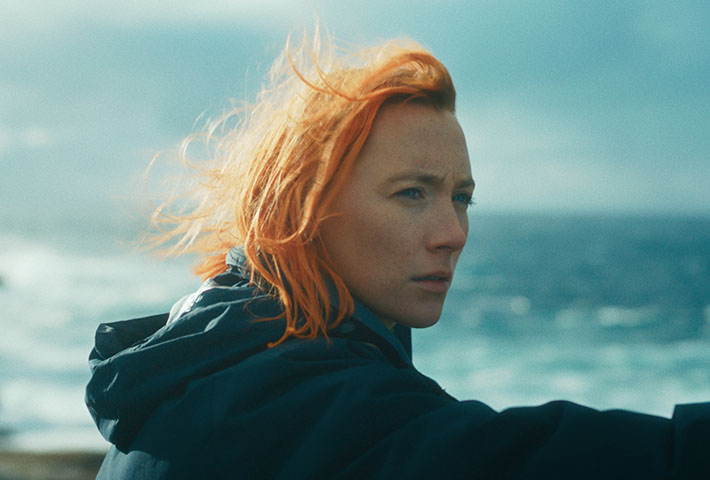
‘The Outrun’ review: A moving tale of addiction, recovery and Saoirse Ronan’s exceptional skill
Blind drunk at closing time, Rona — a bright, late-20s graduate student majoring in biology — has again pushed her luck and, literally kicking and screaming, provoked the bartender into tossing her out of a London pub onto the sidewalk. Her purse’s contents scatter and roll. She has been here before, or thereabouts.
“The Outrun” tells her addiction and recovery story with clear-eyed and nicely unpredictable swerves. Saoirse Ronan does subtly spectacular work in every phase of this character’s odyssey. Rona is based on Amy Liptrot, whose memoir has been lightly fictionalized but not falsified in the script co-written by Liptrot and director Nora Fingscheidt. It’s a consistently absorbing movie, visually vibrant nearly to the point of self-consciousness, its blues and greens and hot neon dance-party memories colliding and coalescing throughout.
The narrative intersperses Rona’s heady London years with later parts of her life on the starkly beautiful Orkney Islands off Scotland’s northeastern coast. Watching “The Outrun,” its title referring to outlying farmland pasture, I found myself asking the Saoirse Ronan question that has come up many times and many films previously. What’s the secret to her easy gravity, the calm and storm and back again so effortlessly managed? That precise emotional stillness suddenly giving way to pure, kinetic expressivity?
Maybe there is no secret. Maybe Ronan, piercing blue eyes aside, simply is one of those actors who learned on camera, a lot, as a preteen and then became an adult and a famously reliable and compelling performer in the bargain. British roles, American parts, comedies, dramas, contemporary work, period pictures, all of it. Ronan’s camera presence has a studious air to it, sometimes. At her best, though, it’s careful listening and watching. In “The Outrun” she’s giving one of her truest, cleanest portrayals, which is an interesting paradox, since Rona is both a mess and, later, a conduit for reflection, her own and the audience’s.
After a violent, half-remembered assault following the film’s opening pub sequence, Rona returns to the Orkney Islands where she grew up. Recovery will not be easy, she realizes. Her alcoholism has informed her early adult years, indelibly. At one point, later than we want to hear it, she says with terse clarity, like a death sentence: “I can’t be happy sober.” The film doesn’t end there, but “The Outrun” makes nothing easy, or pat.
Rona’s sheep-farmer father (Stephen Dillane, excellent) lives in a mobile home at cliff’s edge; his mental health challenges have led him, reluctantly, in and out of institutions. Separated, Rona’s mother (Saskia Reeves, exceptional at subtle indications of how the past feeds the present) has turned to God for solace and purpose. Rona finds herself at odds with both parents. She’s itching to return to London, and all too plainly itching to drink again.
Counting her days of sobriety, she finds a makeshift Orkney community among the nonprofit Royal Society for the Protection of Birds, aka the RSPB. She’s assigned to study the prospects and conditions for a locally rare species, the corncrake, and canvases the local residents for their assistance. “The Outrun,” blessedly, treats the wildlife preservation activities the way director Fingscheidt treats everything else in Rona’s uncertain life: vividly but matter-of-factly, without a lot of fuss. Rona gradually rediscovers the things she loved about the islands as a girl, while discovering new ones. Part of the movie takes her to another, smaller Orkney Island, Papa Westray, where she relishes the isolation, the crazy gales and the joys of a swim in incredibly cold water.
The flashback interweaves of “The Outrun” recall Cheryl Strayed’s memoir “Wild,” the film version of which starred Reese Witherspoon. “The Outrun” has the edge, I think, in its editing acumen; in an eyeblink, we’re thrown back into Rona’s earlier life, and self, in London, with a boyfriend (Paapa Essiedu) increasingly overmatched by Rona’s addiction. In her character’s jagged-edge extremes, Ronan’s performance bears down, fiercely, without extraneous flourishes — in a heartbreaking leap, or stumble, her Rona trades raging belligerence (“You’re trying to tame me! You’re trying to control me!” for worlds of hurt found in a single line (“Whatever I did, I’ll never do it again, I promise”).
It’s not always easy to witness. But recovery stories that go easier are usually the ones lying about what’s happening, and how someone got there.
‘The Outrun’
3 stars (out of 4)
MPA rating: R (for language and brief sexuality)
Running time: 1:58
How to watch: In theaters Oct. 4
Related Articles
Movie review: Helen Mirren tells a story of evil and hope during WWII in ‘White Bird’
‘The Outrun’ review: A moving tale of addiction, recovery and Saoirse Ronan’s exceptional skill
Haunted mazes, jack-o’-lantern festivals, fall arts: A roundup of Twin Cities Halloween events
‘A Different Man’ review: A new face and a new life in a comedy that’s more than skin-deep
5 ways Gov. Tim Walz and comedian Jim Gaffigan, who plays him on ‘SNL,’ are more alike than you think


